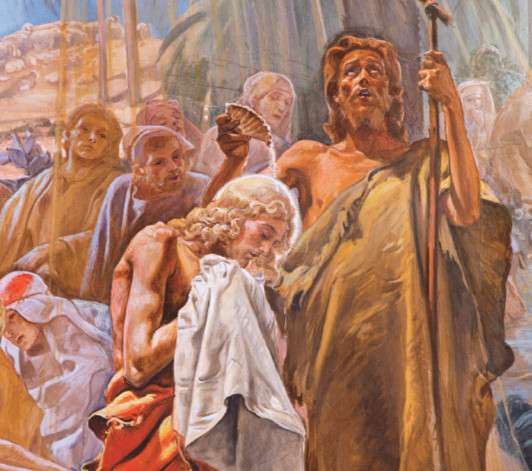2nd Sunday in Ordinary Time - Called to be Holy
The year is very new and there are as ever many questions on the horizon. We look at the days and months ahead and wonder how those still suffering the effects of Covid will fare and when the wars and strife in Ukraine, Ethiopia, Haiti, and so many other places will end. How can we put an end to poverty and homelessness? Will we ever be able to speak civilly to one another again? When will peace rule peoples’ hearts? As "ordinary time" begins to unfold, we will be constantly reminded that God has not and will not abandon us. The light that led the Magi will shine light on our dark winter days. Into this darkness comes the promise of Light. Will all things get better immediately? Not likely. But a way has been illumined, a path has been shown to us and we must continue to live by the light we have seen.
 Today’s scripture opens with a focus on Isaiah’s “servant” - the light to the nations. This light then moves to John the Baptist and his testimony about Jesus. And finally that light comes to rest on us, both as a community of faith and as individual witnesses to the light of Christ. We are called to be holy.
Today’s scripture opens with a focus on Isaiah’s “servant” - the light to the nations. This light then moves to John the Baptist and his testimony about Jesus. And finally that light comes to rest on us, both as a community of faith and as individual witnesses to the light of Christ. We are called to be holy.
Isaiah is dominant in our liturgical readings as we begin our new year. We begin with God's promise: "I will make you a light to the nations, that my salvation may reach to the ends of the earth." Next week we will discover the promise fulfilled: "The people who walked in darkness have seen a great light; upon those who dwelt in the land of gloom a light has shone."
John the Baptist also has a prominent place during these weeks. In last week's reading, John protested his unworthiness at the baptism of Jesus. This week he boldly proclaims: "Behold, the Lamb of God, who takes away the sin of the world." Finally, next week, we will see John arrested - his mission fulfilled.
In the Gospels of Luke and Matthew this scene has a voice from heaven affirming Jesus as “the beloved Son,” perhaps a continuation of the Epiphany narrative. But today’s revelation is different. It comes through the human voice of the Baptist. John was a forthright, outspoken prophet, but also quite vulnerable. The Baptist’s voice gives rich testimony to Jesus’ identity. He tells us that Jesus is the Lamb of God who “takes away the sin of the world. He is the one who ranks ahead of John, the one upon whom the Spirit came and remained. John also tells us that Jesus is the one who will “baptize with the Holy Spirit” and who is “the Son of God.”
In Matthew and Luke it is the voice of God which identifies Jesus. But in the Gospel of John, the Baptist is the clear witness to him for us. Today's Gospel has turned our attention to human witnesses, those who are the lights in the world, who speak and act out of their own faith experience and thus give witness to Jesus’ identity.
Early Christians were drawn to the Servant Songs of Isaiah and they saw themselves as a people called out of exile through Jesus, God’s obedient servant. He was the sign of God’s compassion and justice to all nations that "my salvation may reach to the ends of the earth.” These same Christians also saw themselves in the prophetic role of God’s servant, called and challenged to be holy, to be a people of light, a sign of God’s outreach to all who dwell in any kind of darkness.
In Jesus, we too are called to be this “light to the nations.” But we have a long way to go before we, as a community, can be called servants of God’s compassion and peace in the world. If we truly are lights to the world, then we are on display all the time. Who we are as the people of God and how we interact among ourselves and others, will also be a message to those in exile, calling them out of their darkness into the loving embrace of the Father.
This, then, is our call. And if we are faithful to it, living as Paul describes us today - those “who have been sanctified in Christ Jesus, called to be holy” - then we can become the servant community of people that Isaiah envisioned, a “light to the nations.”